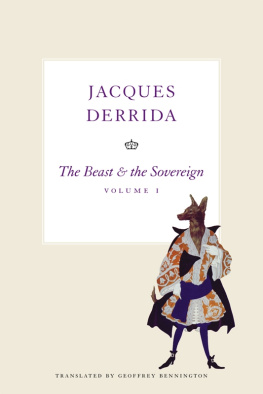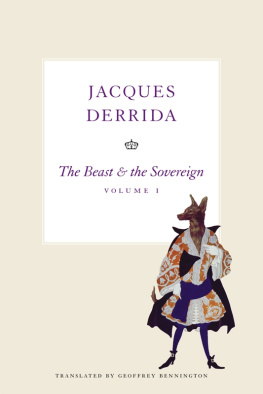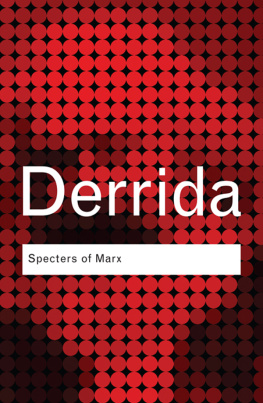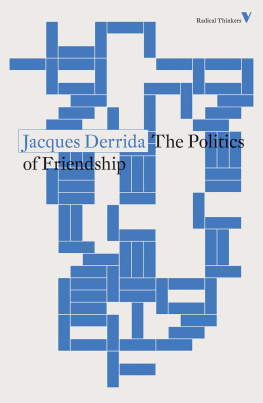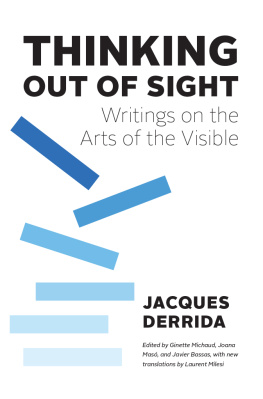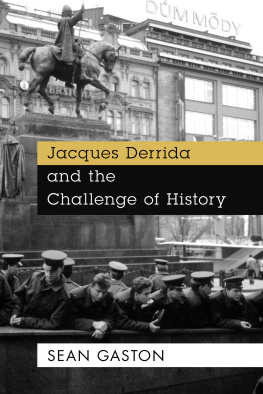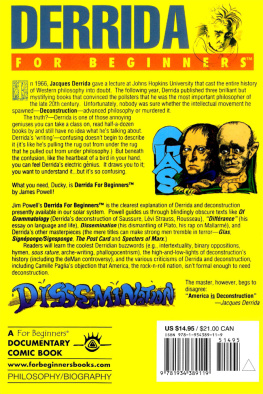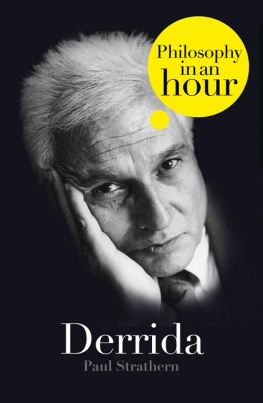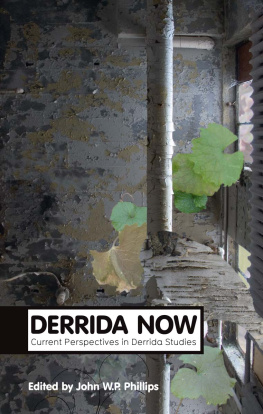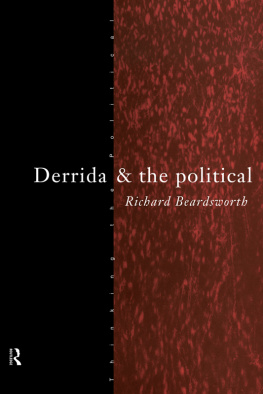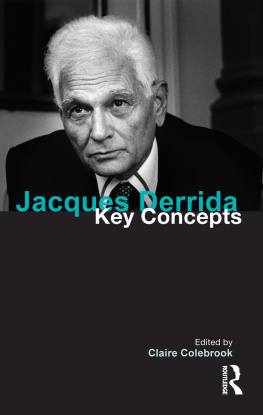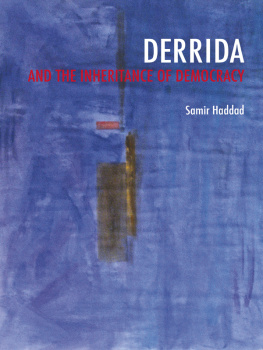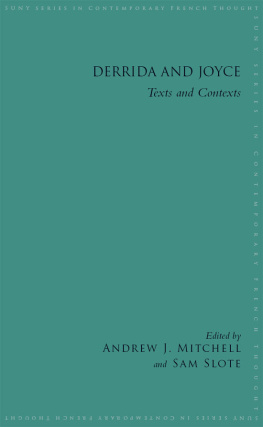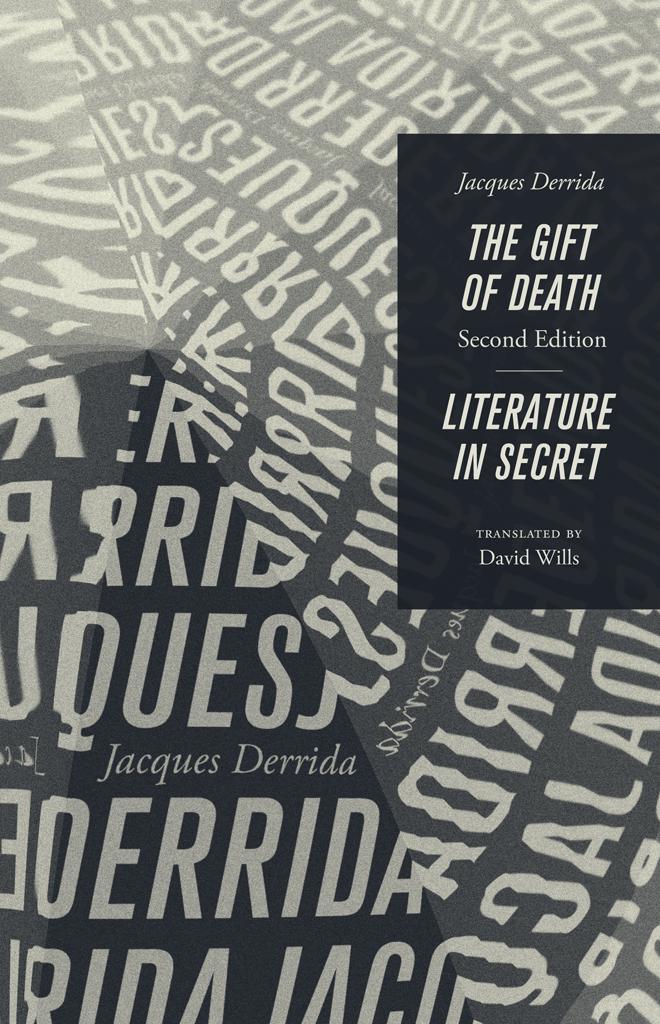Originally published as Donner la mort by Jacques Derrida, copyright
ditions Galile 1999.
The University of Chicago Press, Chicago 60637
The University of Chicago Press, Ltd., London
1995, 2008 by The University of Chicago
All rights reserved. Published 2008
Printed in the United States of America
24 23 22 21 20 19 18 17 7 8 9 10 11 12 13
ISBN-13: 978-0-226-50297-7 (paper)
ISBN-13: 978-0-226-57167-6 (e-book)
Library of Congress Cataloging-in-Publication Data
Derrida, Jacques.
[Donner la mort. English]
The gift of death ; and, Literature in secret / Jacques Derrida ; Translated by David Wills.2nd ed.
p. cm.
Includes bibliographical references.
ISBN-13: 978-0-226-14276-0 (cloth. : alk. paper)
ISBN-13: 978-0-226-14277-7 (pbk. : alk. paper)
ISBN-10: 0-226-14276-0 (cloth. : alk. paper)
ISBN-10: 0-226-14277-9 (pbk. : alk. paper)
1. Generosity. 2. Gifts. 3. Responsibility. I. Derrida, Jacques. Literature in secret. II. Title. III. Title: Literature in secret.
B2430.D483D6613 2008
194dc22
2007024288
The paper used in this publication meets the minimum requirements of the American National Standard for Information SciencesPermanence of Paper for Printed Library Materials, ANSI Z39.48-1992.
THE GIFT OF DEATH
SECOND EDITION
&
LITERATURE IN SECRET
JACQUES DERRIDA
TRANSLATED BY DAVID WILLS
THE UNIVERSITY OF CHICAGO PRESS
CHICAGO AND LONDON
RELIGION AND POSTMODERNISM
A series edited by Mark C. Taylor and Thomas A. Carlson
RECENT BOOKS IN THE SERIES
Mark C. Taylor, After God (2007)
Slavoj Zizek, Eric L. Santner, and Kenneth Reinhard, The Neighbor: Three Inquiries in Political Theology (2006)
Vincent P. Pecora, Secularization and Cultural Criticism: Religion, Nation, and Modernity (2006)
Paolo Apolito, The Internet and the Madonna: Religious Visionary Experience on the Web (2005)
Kevin Hart, The Dark Gaze: Maurice Blanchot and the Sacred (2004)
CONTENTS
TRANSLATORS PREFACE TO THE 2007 EDITION
The Gift of Death was originally translated from the essay Derrida published in a collection of papers from a conference held at Royaumont in December 1990 on The Ethics of the Gift (ed. Jean-Michel Rabat and Michael Wetzel, Lthique du don: Jacques Derrida et la pense du don, Colloque de Royaumont, 1990 [Paris: Transition, 1992]). Derridas text was not, however, the paper he delivered at that conference, that being part of a volume already destined for publication (Donner le temps [Paris: Galile, 1991]) and now translated as Given Time: 1. Counterfeit Money, trans. Peggy Kamuf (Chicago: University of Chicago Press, 1992).
In 1999, he published the volume Donner la mort (Paris: Galile), containing the original text as well as an essay on Kafka entitled La littrature au secret. The present edition represents the first complete English translation of that volume, including a thorough revision of the 1995 English publication of The Gift of Death (Chicago: University of Chicago) on the basis of both Derridas emendations of his own text and my corrections of my earlier version, as well as the addition of the first English translation of the Kafka essay.
The French title Donner la mort plays on the ordinary sense of donner, meaning to give, and the idiomatic sense of that expression, which means in English to put to death, as in se donner la mort, to commit suicide. In translating Derridas title with the noun phrase I seek to have heard in it (or behind it) the English expression kiss of death, as a means of conveying that active sense. Wherever possible I have tried to follow the idea of giving or granting, having recourse to to put to death when comprehensibility so demands, sometimes adding the French for mnemonic purposes. Whenever to put to death is used, however, the reader should also hear the sense of giving.
The 1999 Galile edition of Donner la mort was accompanied by the following text in the form of a flysheet (Prire dinsrer):
In spite of various indications, in spite of the sign of the gift, in spite of the predictable passage from time to death, in spite of the albeit furtive appearance of the narrator of Baudelaires Counterfeit Money, Donner la mort is not a sequel to Given Time: 1. Counterfeit Money.
The consistently dominant figure here is Abraham: certainly he who, above all, received the three men who were Gods envoys at the Oak of Mambre, and gave them hospitality, thereby inaugurating a whole tradition. But this Abraham is also he who, after all, knows how he must keep silent [sait devoir se taire] on Mount Moriah, up until the angel, another envoy from God, interrupts the death that he is preparingin order to give it to Godto impose [donner] on his favorite son Isaac; unless it be, as in the lands of Islam, Ibrahims Ishmael.
How does one interpret Abrahams secret and the law requiring his silence? Why does it seem incommensurable with the interdiction that seems to reduce all his family to a type of muteness: all those, male and female, to whom he has, all the same, never confided anything; as well as Sarah and Isaac, Hagar and Ishmael, who were so summarily dismissed? It is those four who were closest to him, made to play the part of extras, whom we intend to bring discreetly back to center stage.
One no longer knows how to understand the indecipherability of this unheard-of moment. One no longer knows how to reinterpret it. One no longer knows, because it is no longer a question of knowledge, who has the prerogative to reinterpret the infinite number of interpretations that have always foundered here in view of the shore, or sunk into the abyssal depths that open for our memory, being discovered and covering over themselves at the same time.
Yet we are that memory, forewarned and summoned by it. Our reason forces us to take it on board on the high seas and just prior to our shipwreck [arraisonns en pleine mer et avant le naufrage]. It assigns to us an inalienable heritage. Granted, we can deny it, but all the same it remains undeniable, and continues to dictate to us a certain reading of the world. A reading of what a world means. Indeed, a reading of the contemporary globalization of avowal, repentance, and forgiveness. According to Kierkegaards writings, Abraham asked for Gods forgiveness, not for having betrayed him, but for having obeyed him!
The history of Europe, of responsibility, of subjectivity, and of secrecy, the possibility of literature, perhaps those are some of the names, among others, perhaps the nicknames, of what is at stake here.
In addition, the more than One. And the question of knowing why, by means of its Abrahamic filiation, literature would be required to ask forgivenessfor not meaning (to say) [de ne pas vouloir dire]. And why God would still have to swear.
We will pay heed here to several great vigil-keepers, brought together around the biblical corpus. All of them are men. They argue over the night. Kierkegaard first of all, Kierkegaard indefinitely, and Kafka especially, and Melville, but also Patoka, following after Plato, Nietzsche, Heidegger, and Lvinas.
THE GIFT OF DEATH
JACQUES DERRIDA
TRANSLATED BY DAVID WILLS
ONE
Secrets of European Responsibility


